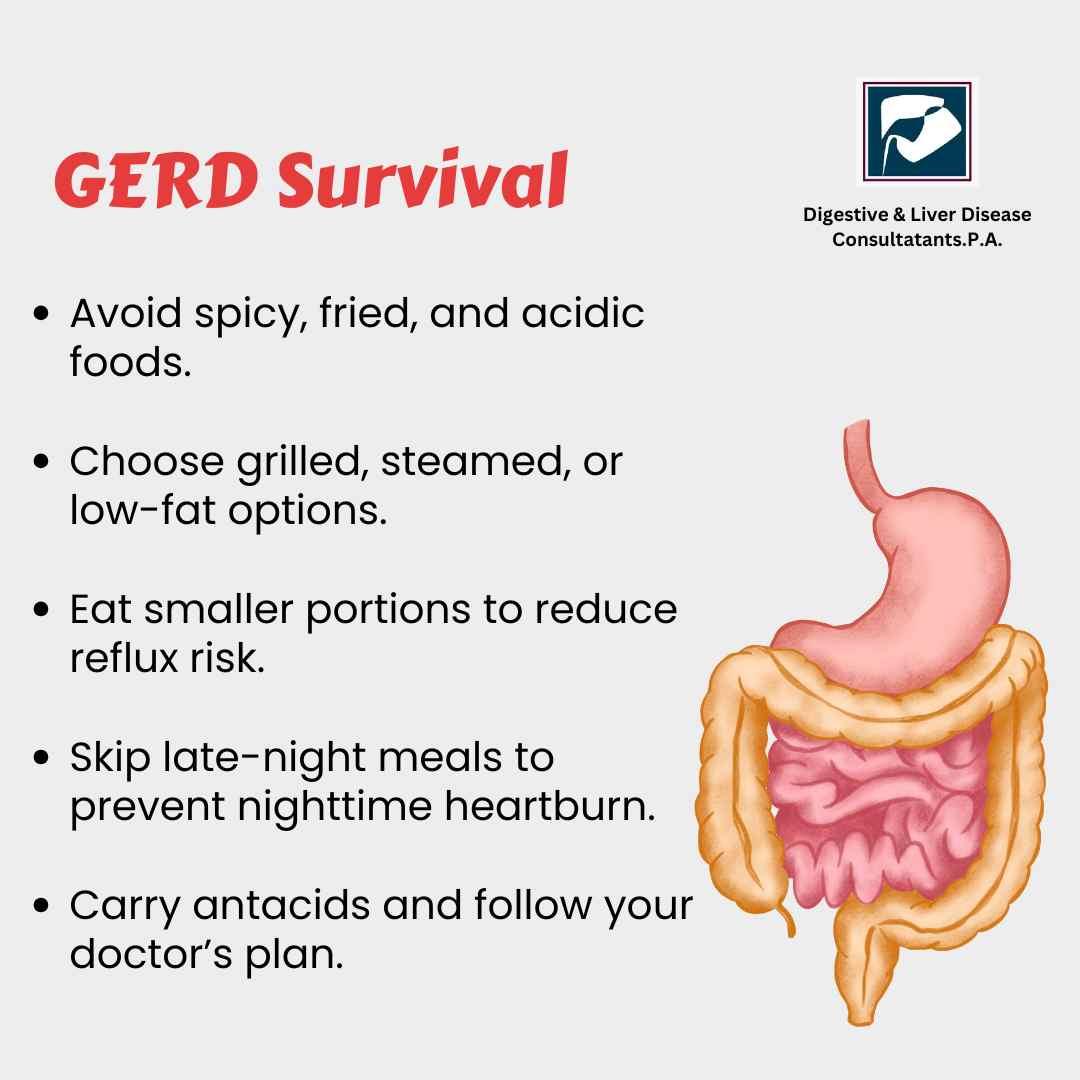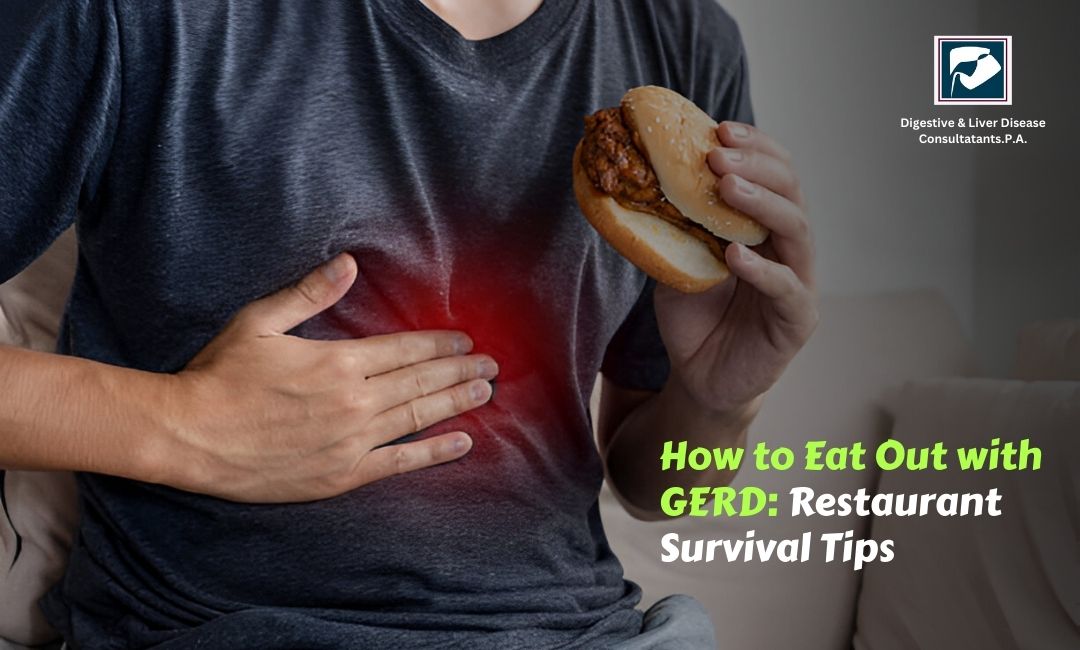Managing gastroesophageal reflux disease, or GERD, can feel challenging, especially when it comes to dining out. The comfort of enjoying a meal at your favorite restaurant can quickly turn into discomfort, heartburn, or acid reflux if you’re not careful. However, with some practical strategies and awareness, you can still enjoy restaurant meals without triggering GERD symptoms.
Digestive & Liver Disease Consultants, P.A. understands the struggles of GERD patients and provides expert guidance to help you maintain a comfortable and healthy lifestyle.
Understanding GERD and Its Triggers
GERD occurs when stomach acid flows back into the esophagus, causing symptoms like heartburn, regurgitation, chest discomfort, and sometimes difficulty swallowing. While medications can help control GERD, avoiding certain foods and eating habits is equally important. Common triggers include:
- Spicy foods
- Fatty or fried foods
- Citrus fruits and juices
- Tomato-based sauces
- Chocolate and peppermint
- Caffeinated and carbonated beverages
- Alcohol
Knowing your personal triggers and planning your meals accordingly is key to enjoying dining out without discomfort.

Choosing the Right Restaurant
Before making a reservation or walking into a restaurant, consider these tips:
- Check the Menu Online: Most restaurants have online menus. Look for options that are grilled, baked, steamed, or roasted rather than fried or sautéed in heavy oils.
- Opt for Restaurants with Flexible Menu Options: Establishments that allow substitutions or modifications can be lifesavers for GERD patients.
- Avoid Buffets: Buffets may encourage overeating, which increases the risk of acid reflux. Stick to a carefully chosen portion.
By planning ahead, you can minimize the risk of encountering GERD triggers.
Smart Ordering Tips
Once at the restaurant, ordering strategically is crucial:
Ask About Ingredients and Preparation: Don’t hesitate to ask your server about the cooking methods and ingredients in your meal. This ensures you avoid hidden triggers.
Choose Lean Proteins: Options like grilled chicken, fish, or tofu are less likely to trigger reflux compared to fatty meats.
Include Non-Acidic Vegetables: Vegetables like broccoli, zucchini, and green beans are gentle on the stomach. Avoid tomatoes, onions, and peppers if they are known triggers.
Go Easy on Sauces and Dressings: Creamy sauces, heavy dressings, and tomato-based sauces can aggravate GERD. Ask for dressings on the side or request olive oil and vinegar.
Select Whole Grains: Brown rice, quinoa, and whole-grain bread are safer choices than white bread or refined grains.
Portion Control Matters
Large meals can increase stomach pressure and worsen acid reflux. Consider these strategies:
- Share a Meal: Splitting an entrée with a friend allows you to enjoy dining out without overeating.
- Ask for a To-Go Box: Portion half of your meal into a takeout box before you start eating.
- Avoid Late-Night Dining: Eating close to bedtime can worsen reflux. Try to finish your meal at least 2–3 hours before lying down.
Mindful Eating Habits
How you eat is as important as what you eat:
- Eat Slowly: Chew thoroughly and take your time. Eating quickly can increase the risk of reflux.
- Sit Upright: Proper posture aids digestion and helps prevent acid from flowing back into the esophagus.
- Stay Hydrated, But Not Excessively: Small sips of water are fine, but avoid drinking large amounts with your meal, as this can increase stomach pressure.
Smart Beverage Choices
Beverages can play a significant role in triggering GERD symptoms:
- Avoid Carbonated Drinks: Soda and sparkling water can cause bloating and increase reflux risk.
- Limit Caffeine and Alcohol: Coffee, tea, and alcoholic beverages can relax the lower esophageal sphincter, promoting acid reflux.
- Choose Herbal or Non-Citrus Options: Ginger tea or water are excellent alternatives that are gentle on the stomach.
Dessert Considerations
Desserts are often high in fat, sugar, and chocolate—all common triggers for GERD. Here are some tips:
- Opt for fruit-based desserts without citrus.
- Choose sorbet or low-fat yogurt options.
- Skip chocolate and heavy cream-based desserts if you are prone to reflux.
Communicating with Restaurant Staff
Don’t hesitate to speak up. Most restaurants are accommodating when you explain dietary restrictions:
- Request meals without frying or heavy oil.
- Ask for dressings, sauces, or cheese on the side.
- Inquire if they can prepare dishes with steamed or grilled options.
- Being proactive can make your dining experience much more enjoyable.
Planning Ahead
For frequent restaurant visits, consider:
- Keeping a list of your personal GERD triggers.
- Maintaining a food diary to track meals and symptoms.
- Planning lighter meals earlier in the day if you know you will dine out later.
When to Seek Medical Advice
Even with careful planning, GERD symptoms can sometimes persist or worsen. Chronic GERD can lead to complications such as esophagitis, ulcers, or Barrett’s esophagus. If you frequently experience heartburn, regurgitation, or chest discomfort after meals, consult a gastroenterologist.
Digestive & Liver Disease Consultants, P.A. offers expert care for GERD and other digestive disorders. Our team of specialists provides personalized treatment plans, including lifestyle guidance, medication management, and advanced diagnostic procedures, ensuring you can enjoy meals safely without constant discomfort.
Why Choose Digestive & Liver Disease Consultants, P.A.?
Digestive & Liver Disease Consultants, P.A. is a trusted leader in digestive health in the United States. We provide comprehensive care for conditions such as GERD, liver diseases, and other gastrointestinal disorders. Our team combines advanced technology with compassionate care, focusing on improving your quality of life. From minimally invasive procedures to personalized dietary counseling, we are committed to helping you manage your digestive health effectively.
Conclusion
Dining out with GERD doesn’t have to be a stressful experience. By understanding your triggers, making smart menu choices, practicing portion control, and communicating with restaurant staff, you can enjoy meals without discomfort. Incorporate mindful eating habits, stay hydrated wisely, and plan ahead to maintain your digestive wellness.
If you suffer from persistent GERD symptoms or want guidance on managing your condition, consult the experts at Digestive & Liver Disease Consultants, P.A. Our gastroenterologists can provide the care, advice, and treatment you need to live comfortably and enjoy your meals again.






